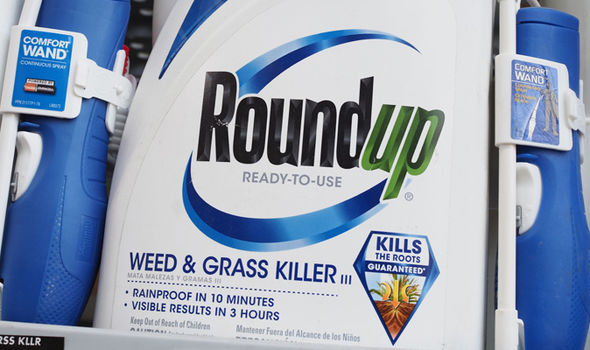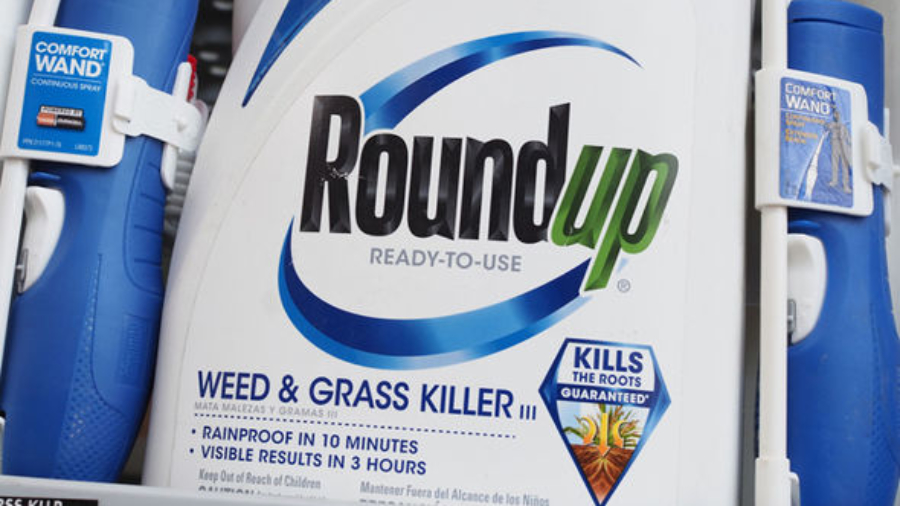Written by Katie Terrell Hanna
You’ve likely heard of Roundup® Weed Killer. Roundup® is an herbicide whose key ingredient is glyphosate. Glyphosate is a synthetic compound and a nonselective systemic herbicide, particularly effective against perennial weeds. It was developed by a Monsanto scientist in 1970 and works through absorption which results in the hosts (plant, crop or weed) inability to produce a particular enzyme necessary for survival, and thus, it dies.
For large agricultural companies, the most cost-effective measure for weed control is a blanket application of herbicide to all crops. So naturally, the next step for Monsanto was to manufacture a line of glyphosate-resistant crops that could survive the use of the herbicide. This ingenious measure now gives them control over the problem and the solution.
Today, glyphosate has evolved into the most commonly used herbicide in the United States along with glyphosate-resistant crops. However, some studies have shown a link between glyphosate exposure and an increased risk of certain cancers such as Non-Hodgkin’s Lymphoma.
In March 2015, the IARC or International Agency for Research on Cancer, a division of the World Health Organization, classified glyphosate as a Group 2A Herbicide that could be carcinogenic to humans. The agencies findings concluded that there was “limited evidence of cancer in humans and sufficient evidence of cancer in experimental animals.” In addition, they also stated that there was “strong evidence for genotoxicity, both for pure glyphosate and for glyphosate formulations.”
The cancers most commonly linked to Group 2A Herbicides include non-Hodgkin lymphoma, lymphocytic leukemia, B-cell lymphoma, and multiple myeloma. While the evidence for its toxicity in humans might be limited, it was enough to convince a California judge to hear a case from a plaintiff who believes he developed cancer due to exposure to glyphosate through the use of Roundup® Weed Killer.
In a 2016 case filing, DeWayne Johnson v. Monsanto, the plaintiff, a 46-year-old school groundskeeper diagnosed with terminal Non-Hodgkin’s Lymphoma claims that the cause of his diagnosis is heavy, repeat exposure to glyphosate over many years of use. The case states that Monsanto was notified by the IARC Working Group that glyphosate had been classified as a Group 2A Herbicide and could be carcinogenic to humans. Despite these indications, Monsanto proceeded to market the herbicide in Roundup and other related products. Therefore, they are compelled to pay damages to the plaintiff.
One of Johnson’s lawyers, Brent Wisner, stated that he used Roundup® and a similar product, Ranger Pro, in his grounds-keeper role. “He sprayed large quantities from a 50-gallon tank attached to a truck, and during gusty winds, the product would cover his face. Once, when a hose broke, the weed killer soaked his entire body.” Johnson claims he read the label and even contacted the company but was never informed that he could develop cancer from its use.
In a statement, Bayer-Monsanto representatives explained, “While we have great sympathy for the plaintiff, we are confident that our glyphosate-based herbicides were not the cause of their injuries and we will vigorously defend them at trial.”
In August of 2018, the jury ruled that Bayer-Monsanto was indeed negligent and therefore ordered to pay $39 million dollars in compensatory damages and $250 million in punitive damages.
The ruling comes more than two years after the original filing, a seemingly long time for Mr. Johnson yet considered a speedy outcome by court standards thanks to a California law that permits expedited trials for dying plaintiffs.
Robert F. Kennedy Jr., a member of the plaintiff’s legal team stated, “This jury found Monsanto acted with malice and oppression because they knew what they were doing was wrong and doing it with reckless disregard for human life.”
Monsanto spokesman Scott Partridge said regarding the case, “We are sympathetic to Mr. Johnson and his family,” but will “continue to vigorously defend this product, which has a 40-year history of safe use and continues to be a vital, effective, and safe tool for farmers and others.”
While Monsanto continues to insist that glyphosate is safe in any quantity, a part of the plaintiff’s case indicated that there is a mix of several chemicals in Roundup®, namely surfactant ethoxylated tallow amine, which could have increased the toxicity of glyphosate.
In December 2017, The U.S. Environmental Protection Agency concluded that glyphosate was not likely carcinogenic to humans. Still, the IARC claims that testing has been predominantly on pure glyphosate and that there has been an insufficient amount of testing done on the mixture of glyphosate with the other aforementioned potentially harmful ingredients used in Roundup®. In DeWayne Johnson v. Bayer-Monsanto, the plaintiff’s attorneys stated that this lack of specialized testing is proof of negligence on the part the pharmaceutical and agricultural conglomerate.
In October 2018, a judge from the San Francisco Superior Court denied a request for a new trial by Bayer-Monsanto as well as reduced the total damages from $289 million to $78.5 million.
Still, the ball is rolling now for future suits against the glyphosate proponent. In fact, Werner Baumann, CEO for Bayer-Monsanto has recently stated that the company now faces over 8,000 lawsuits regarding their glyphosate products.
In February 2019, a trial in San Francisco federal court, where the Roundup® lawsuits are being consolidated, is scheduled to begin. This time, the plaintiff is Edwin Hardeman who began using Roundup in the 1980s to control poison oak and other weeds on his property. He claims to have sprayed “large volumes” of Roundup for many years on a regular basis. He was diagnosed with non-Hodgkin lymphoma, in February 2015.
The next move for Bayer-Monsanto is unclear. However, Baumann did tell reporters, “If we can settle nuisances at some point where the defense costs in preparing cases are higher than potential settlement amounts, we will, of course, consider it from an economic standpoint.”
Bayer, a German pharmaceutical company, acquired agricultural giant, Monsanto for $63 billion in 2018, making it the largest agricultural chemical maker in the world. With the enormity of its financial investment and the slew of nervous investors, it appears unlikely that the company will back-peddle on its claims that glyphosate is safe or take Roundup® and similar products off the market.
If you, or a loved one have been exposed to glyphosate and been diagnosed with Non-Hodgkin’s lymphoma, please visit our site to be connected with an attorney.
Sources:
Valavanidis, Athanasios. (2018). Glyphosate, the Most Widely Used Herbicide. Health and safety issues. Why scientists differ in their evaluation of its adverse health effects. 1.
IARC. (2015, March). Monograph on Glyphosate. Retrieved from https://www.iarc.fr/featured-news/media-centre-iarc-news-glyphosate/
EPA. (2017, December 18). Assessment for Glyphosate. Retrieved from https://www.epa.gov/pesticides/epa-releases-draft-risk-assessments-glyphosate
Dewayne Johnson v. Monsanto. Sup. Ct., CA. 2016
Hardeman v. Monsanto. Dist. Ct., N.D. CA 2017

Katie Terrell Hanna
Katie Terrell Hanna is a professional freelance writer and consultant. She developed an interest in litigation journalism after an internship at the Office of State Attorney in the 15th Judicial Circuit of Palm Beach County, Florida. She is also a graduate of the Center for Pre-Law/Law Related Careers at the Gerald A. Williams Center for Pre-Law in West Palm Beach, Florida and was inducted into the Law Honor Society of her graduating class.

Get a Free Roundup Case Review
If you or a loved one have been diagnosed with non-Hodgkin’s lymphoma or another form of cancer after using Roundup, you may be eligible for a compensation.


